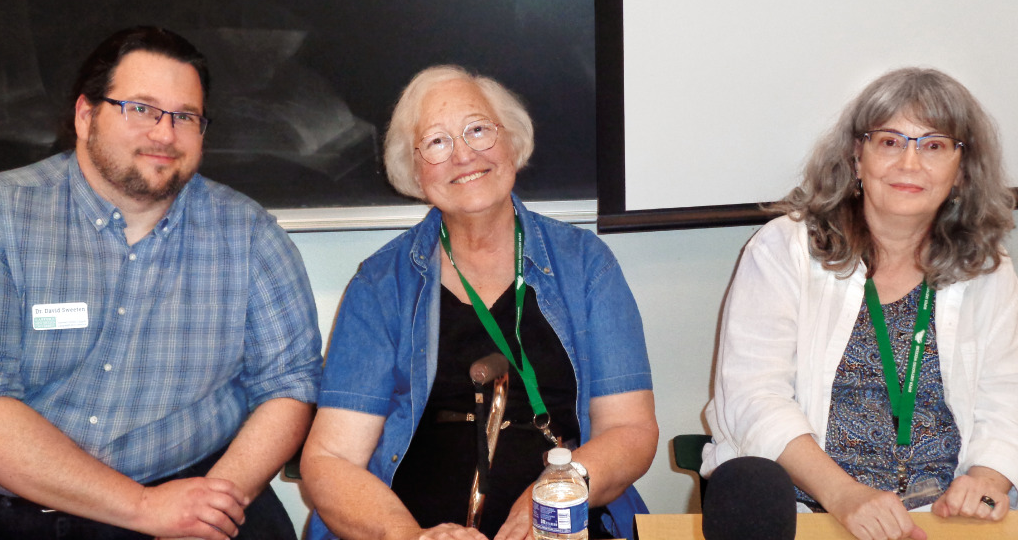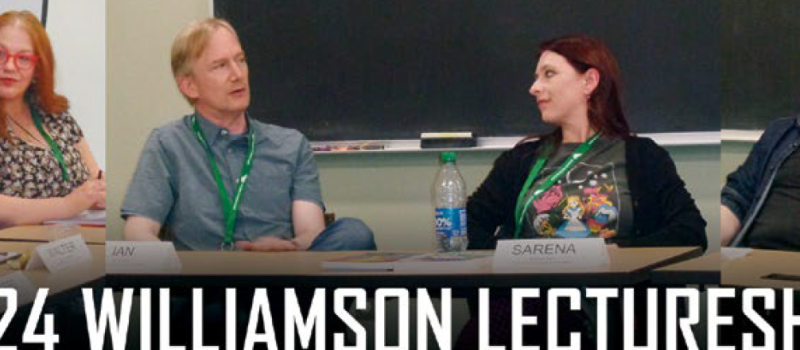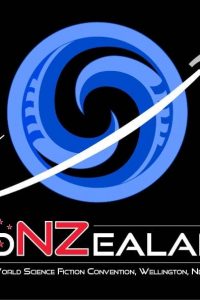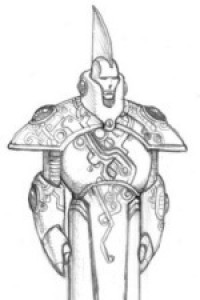2024 Williamson Lectureship
The 47th Williamson Lectureship was held April 11-13, 2024 in Portales NM. The theme of Lectureship, held at Eastern NM University and around town to honor SF pioneer Jack Williamson, was “Oh, the (In)Humanity”, and included discussions of AI, robots, posthumans/anti-humans, and guest of honor Martha Wells’s Murderbot Diaries, including 2023’s System Collapse. Connie Willis served as toastmistress.
San Jose criminalist Cordelia Willis started events Thursday with a presentation on “Courting Disaster: Experiences as an Expert Witness” to an audience of 36 people, where she explained how to be an expert witness, and talked about some of her various experiences.

Afterward, Lectureship organizer David Sweeten welcomed attendees to the Cantina Carnival, organized by faculty and students. It included games, a Williamson history display, crafts, and a raffle for prizes. Dinner at a local steakhouse finished out the day.
Friday began with three academic papers on “The (In)Human in History and Adaptation”. Wells then read Home: Habitat, Range, Niche, Territory to about 45 people. “The theme of bodily autonomy and ownership has always interested me. It’s a reaction to trauma. I had a lot of emotional and mental abuse when I was younger…. There’s a lot going on in this universe. Eidetic memory is part of Murderbot, and also the ability to do several things at once. People have likened it to anxiety. This universe is corporate dystopia in the near future. You can imagine corporations wanting to control people and machines.”
Wells, consulting producer on the upcoming Apple TV+ Murderbot series, revealed, “They’ve sent me clips without the special effects. It’s very cool, but looks funny with people in green outfits and hoods. I should be on set mid-May.” Asked for writing advice, she said, “Learn as much as you can about the field. It’s a job, but it’s a job tied into your emotions. There are a lot of scams, so know how the money should flow. Most important, bring yourself – your perspective and voice – to the writing.”
Sweeten welcomed 95 people to Friday’s Cajun luncheon with a trivia quiz. Connie Willis announced there was only one news story this year – April 8’s solar eclipse. “I didn’t go this time because I didn’t want to be stuck in a traffic jam in Alabama,” she said. “Many animals react strangely to eclipses, and humans react especially strangely. Some people claimed this eclipse was a harbinger of the end times, and others claimed the darkness would last three or four days causing chaos. Obviously, they’re not clear on the concept. It’s just four minutes of excitement, fun, and nonsense.”
Wells talked about robot history. “People said All Systems Red was a cute robot story, but it involves slavery, autonomy, sentience, machine intelligence and more. Karel Čapek wrote about robots in R.U.R., and its’s interesting that people think machine intelligence created for one purpose is okay. It’s also interesting how many stories end with machine intelligence revolting in a murderous spree. That can be an analogy to slavery revolts. Two influences were Colossus: The Forbin Project and Wargames,” she continued. “I wanted to write an AI story where it doesn’t want to become human. It’s a very personal story to me, and I learned a lot about myself through it. Murderbot is a story about bodily autonomy and being able to choose your own future.”
In the afternoon, about 48 people attended panel discussions. “Romantasy and Science Fiction” included Darynda Jones, Jeffe Kennedy, Kelly Robson, and Lauren C. Teffeau. Jones observed, “Things come in waves, and this is the next big wave.” Teffeau noted, “You can’t have a human story without including matters of the heart.” Kennedy said, “Shockingly enough, there’s a huge audience for these stories. There are more female readers now, and they want to read more than just Heinlein and Asimov.”
Across the hallway, the “Posthuman/Anti-human” panel had Melinda M. Snodgrass, Ian Tregillis, Sarena Ulibarri, and Wells, in which Wells said, “If I’m mad at something, I stick it into Murderbot.” Snodgrass echoed, “Discovering that some of my books have been used to train ChatGPT made me angry.” Ulibarri observed, “You have a sense of your own body and then when you drive a car, you have the sense of an extension of yourself. With a phone plugged into the car, you’re even more extended like a cyborg hybrid.”
The “Building a World for Non-Human People” panel featured Arkady Martine, Tregillis, Wells and Connie Willis, on writing without a human bias. Willis stated, “You try to figure out how a robot would see things as opposed to how humans do. When people write about nonhumans or AI, they tend to have a limited view of what they would want to do.” Martine asked, “How alien is your alien? What are their wants? Their wants may make no sense.”
On the “Exploring the Singularity of AI Apocalypse” panel with Teffeau, Vivian Shaw, John E. Stith, and Walter Jon Williams, Williams said, “We tend to think of ourselves as the center of the universe, and we’re not. AI may not care about us. It might just want to write code.” Shaw commented, “Trying to train an AI is difficult because you can’t program for unpredictable and human situations.” In response to potential AI dangers, Teffeau noted, “You have to look at who is making these developments, and what their goal or motivation is. What’s the incentive and what is the driver of the technology?”
Rounding out the day were “Plotting Without Plodding” with Kennedy, Robson, Snodgrass, Ulibarri, and Williams, and the “You Put Some Science in My Fiction” panel with Martine, Shaw, Stith, and Connie Willis. Snodgrass remarked, “I start with a scene of my characters, and then I ask myself how they got there and who they are.” Robson added, “In every story, I ask whether this is the most important thing that’s ever happened to a character. That keeps me on track.” Addressing science and research, Martine commented, “You don’t want the reader to think you don’t know what you’re doing.” Stith added, “In one novel, I had an appendix, so I put all my research in that.”
Friday evening’s dinner party was held at the home of committee members Dave and Susan Asplund. About 35 people chatted and visited while enjoying food and drinks.
Saturday morning, 24 people attended a writers’ workshop on “Foreshadowing” led by Connie Willis. She said, “You’re playing constantly with the reader’s assumptions, and you can use that as a weapon. If you can make people focus on one thing, then they miss what else is going on. These are the same tricks that Sophocles and Shakespeare used. Foreshadowing is one of the most powerful tools that writers have.”
Attendees at the Lectureship included Jack Williamson’s niece, Betty Williamson; Bubonicon organizers Craig W. Chrissinger and Jessica Coyle; author Rae Oestreich; publisher Stephen Haffner; Renae Mitchell of Los Alamos National Laboratory; Connie Willis’s husband, scientist Courtney Willis; Williams’s wife, Kathy Hedges; retired librarian Gene Bundy; retired University president Patrice Caldwell; special collections librarian Regina Bouley Sweeten; and Lectureship organizers Mary Ayala, Jon Barr, Geni Flores, Michelle Schmidt, Barbara Senn and Erik Stanley.
Plans for April 2025’s Lectureship will start soon, including a guest of honor announcement for the 48th Lectureship.
Photographer: Craig W. Chrissinger
While you are here, please take a moment to support Locus with a one-time or recurring donation. We rely on reader donations to keep the magazine and site going, and would like to keep the site paywall free, but WE NEED YOUR FINANCIAL SUPPORT to continue quality coverage of the science fiction and fantasy field.
©Locus Magazine. Copyrighted material may not be republished without permission of LSFF.










